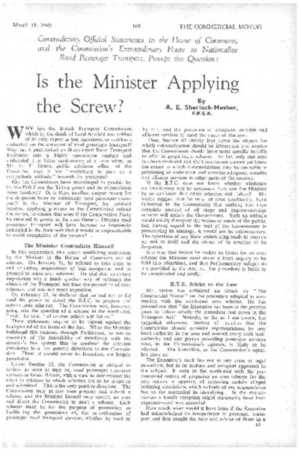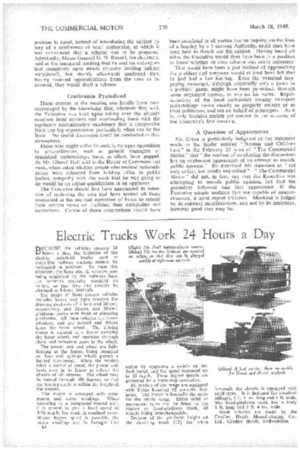Is the Minister Applying the Screw?
Page 11

Page 12

If you've noticed an error in this article please click here to report it so we can fix it.
• Contradictory Official Statements in the House of Commons, and the Commission's Extraordinary Haste to Nationalize Road Passenger Transport, Prompt the Question: By A. E. Sherlock-Mesher, F.R.S.A.
WHY has the British Transport Commission, which by the death of Lord Ashfield was robbed of its only expert in bus operation, so recklessly embarked on the conquest of road passenger transport? Why has it pitchforked an 'ill-equipped Road Transport Executive into a highly speculative venture and embroiled it in bitter controversy at a time when, as Mr. G. E Orton, public relations officer of the Executive, says it has "everything to gain by a
sympathetic attitude" towards its problems?
Has the Commission been encouraged to gamble by its windfall from the Tilling group and its expectations from Scotland? Or is there another, deeper reason for the desperate haste to nationalize road passenger transport? Is the Minister of Transport, for political reasons, applying pressure to the Commission behind the scenes, to ensure that even if the Conservative Party be returned to power at the next General Election road passenger transport will have become so hopelessly entangled in the State web that it would be impracticable to avoid completion of the process?
The Minister Contradicts Himself
In this connection, two recent conflicting statements by the Minister in the House of Commons are of interest. On January 31, he refused to take steps to end voluntary acquisitions of bus companies and to proceed to make area schemes. He said that voluntary negotiation was a much quicker way of realizing the objects of the Transport Act than the procedure of area schemes, and was not more expensive.
On February 21, he declared that he had not so far used his power to direct the B.T.C. to prepare and submit area schemes, The Commission was, however, going into the question of a scheme in the north-east, ," and," he said, "of course, others will follow."
These statements require to be viewed against the background of the terms of the Act. When the Minister bulldozed this measure through Parliament, he was so uncertain of the desirability of interfering with the country's bus system that he confined the relevant provisions to a few general directions to the Commission. These, it should never be forgotten, are largely permissive.
Under Section 63, the Commission is obliged to teview, as soon as may be, road passenger transport services in Great Britain, with a view to determining the areas in relation to which 'schemes are to be prepared and submitted. This is the only positive direction. The Commission may at any time prepare and submit a scheme and the Minister himself may specify an area and direct the Commission to draft a scheme. Each scheme must be for the purpose of promoting, or facilitating the promotion of, the co-ordination of passenger road transport services, whether by road or by rail, and the provision of adequate, suitable and efficient services to meet the needs of the area.
Thus, Section 63 clearly lays down the objects for which nationalization should be introduced and implies that the Commission should have some specific benefits to offer in preparing a scheme. So far, only one area has been reviewed and the Commission cannot yet know the extent to which nationalization may be desirable in promoting co-ordination and securing adequate, suitable and efficient services in other parts of the country.
the B.T.C. does not know whether wholesale nationalization will be necessary, how can the Minister
be so confident that other schemes will follow? His words suggest that he may, at least unofficially, have intimated to the Commission that nothing less than complete control of all stage and express-carriage services will satisfy the Government. Such an attitude would totally disregard the wishes or needs of the public, but, having regard to the zeal of the Government in prosecuting its idealogy, it would not be extraordinary. The operation of any State undertaking tends to become an end in itself and the object of its creation to be forgotten.
It is true that before he makes an Order for an area scheme the Minister must cause a local inquiry to be held into objections, and that Parliamentary safeguards are provided in the Act, but the procedure is liable tc be complicated and costly.
R.T.E. Sticks to the Law
Mr. Orton has criticized an attack by "The Commercial Motor" on the procedure adopted in connection with the north-east area scheme. He has pointed out that "the Executive has been at the greatest pains to follow strictly the procedure laid down in the Transport Act." Nobody, so far as I am aware, has suggested otherwise. Section 63 requires that the Commission should consider representations by any local authority in the area and consult every such local authority and any person providing passenger services who, in the Commission's opinion, is likely to be affected. The Executive, as the Commission's agent, has done so.
The Executive's fault lies not in any error of legal pgocedure, but in its tactless and arrogant approach to the subject. It went to the north-east with the. preconceived notion of preparing an area scheme for the sole reason, it appears, of removing certain alleged irritating restrictions which nobody of my acquaintance has so far succeeded in identifying. In the circumstances a hostile reception might reasonably have been expected—and was accorded.
• How much wiser would it have been if the Executive had acknowledged its inexperience in passenger transport and first sought the help and advice of those in a B3 position to assist, instead of introducing the subject by way of a conference of local authorities, at which it was announced that a scheme was to be prepared. Admittedly, Major-General G. N. Russell, the chairman, said at the inaugural meeting that he and his colleagues had completely open minds (thereby inviting unkind witticisms!), but shortly afterwards confessed that, having received representations from the area to be covered, they would draft a scheme.
Conference Prejudiced Those present at the meeting can hardly have been encouragedby the knowledge that, whatever they said, the Executive was bent upon taking over the already excellent local services and overloading them with the top-heavy administrative machinery that is inseparable from any big organization, particularly when run by the State. No useful discussion could be conducted in that atmosphere.
Those who might suffer financially by open opposition to nationalization, such as general managers of municipal undertakings, have, in effect, been gagged. As Mr. Glenvil Hall said in the House of Commons last week, when asked whether people who resisted nationalization were debarred from holding office in public bodies, sympathy with the work that he was going to do would be an added qualification in an applicant.
The Executive should first have announced its intention of reviewing the area and have invited all those concerned in the use and operation of buses to submit their written views on facilities, their complaints and aspirations. Copies of those observations should have
been circulated to all parties and an inquiry, on the lines of a hearing by a Licensing Authority, could then have been held to thrash out the subject. Having heard all sides, the Executive would then have been in a position to know whether an area scheme was really necessary.
That would have been a just method of approaching the problem and everyone would at least have felt that he had had a fair hearing. Even the wretched farepaying passenger, although admittedly only a pawn in a political game, might have been permitted, through some organized agency, to express his views. Representatives of the local authorities owning transport undertakings spoke mainly as property owners or as local politicians, and not on behalf of passengers. As it is, only Socialist zealots are content in the outcome of the Executive's first meeting.
A Question of Appearances
Mr. Orton is particularly indignant at the statement made in the leader entitled "Women and Children Last," in the February 25 issue of "The Commercial Motor," that "the method of conducting the discussions has an unpleasant appearance of an attempt to muzzle public opinion." He described this statement as "not only unfair, but totally unjustified." "The Commercial Motor" did not, in fact, say that the Executive was attempting to muzzle public opinion, but that the procedure followed had that appearance. If the Executive adopts methods that are capable of misconstruction, it must expect criticism. Mankind is judged by its outward manifestations, and not by its intentions, however good they may be.


























